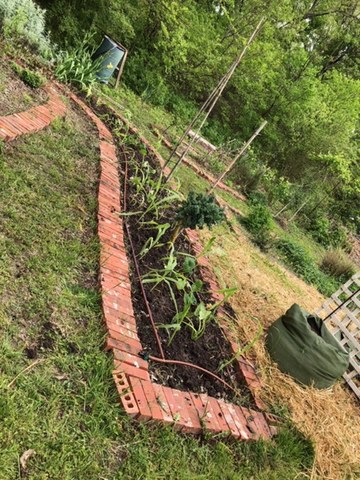
42 Sweet Corn G90 transplants - a hybrid variety planted April 11, 2019 at the Garland Community Garden
Many Ways to Classify Seeds and Plants
In addition to all the varieties and classifications for edibles we grow in our gardens plant may also be classified according to their seed source as Heirloom, Certified Organic, Non GMO, or Hybrid.
Although most of the plants growing in the Garland Community Garden are grown from heirloom seeds or heirloom transplants, we do have many plants that are also hybrid varieties. For example, we recently planted 42 Sweet Corn G90 transplants which are hybrids and our tomato population includes many varieties of Heirloom and Hybrids. As far as I know, we have no GMO plants growing in the Garden.
Heirloom
Heirloom seeds are seeds that have been saved and shared by generations of home gardeners. (Heirloom seeds and plants are also most often certified organic--although not always as you can see by the definition below for "certified organic.") When we state that a variety is an heirloom, we usually mean that it is an open pollinated variety developed before 1940.
[Generally speaking, "open pollination" refers to plants pollinated naturally by birds, insects, wind, or human hands.]
Benefits of Open Pollinated Seeds
- You have the option to produce your own seed supply. Some crops, including beans, peas, tomatoes, and lettuce, are self-pollinating, and thus do not even require much isolation for seed saving. Furthermore, by selecting the best plants from which to save seed, anyone can adapt specific variety strains to their region or microclimate.
- Open pollinated seeds are less costly than hybrids.
- Few can ignore the superior flavor of many open-pollinated varieties. Many breeders who specialize in creating hybrid varieties for large-scale commercial growers tend to focus on qualities other than flavor, such as storage ability, uniformity, and characteristics more pertinent to processing. Suffice it to say that since the onset of modern hybrid plant breeding, flavor has not been a priority.
Certified Organic
Certified organic seeds and plants are grown in organic soil and are only exposed to inputs (like fertilizer and pest controls) permitted by the USDA’s National Organic Program during its growing, processing, and packaging periods.
Non GMO
To qualify as "Non-GMO", the seeds must not have undergone “the mechanical transfer of genetic material outside of natural reproductive methods and between genera, families or kingdoms” as stated in the Safe Seed Pledge.
Why Non-GMO?
The Institute for Responsible Technology offers these 10 good reasons for non-GMO.
- The American Academy of Environmental Medicine (AAEM) urges doctors to prescribe non-GMO diets for all patients. They cite animal studies showing organ damage, gastrointestinal and immune system disorders, accelerated aging, and infertility. Human studies show how genetically modified (GM) food can leave material behind inside us, possibly causing long-term problems.
- GMO's contaminate forever. GMOs cross pollinate and their seeds can travel. It is impossible to fully clean up our contaminated gene pool. Self-propagating GMO pollution will outlast the effects of global warming and nuclear waste. The potential impact is huge, threatening the health of future generations.
- GMOs increase herbicide use.
Most GM crops are engineered to be “herbicide tolerant”?they deadly weed killer. Monsanto, for example, sells Roundup Ready crops, designed to survive applications of their Roundup herbicide.
- Government oversight is lax. Most of the health and environmental risks of GMOs are ignored by governments’ superficial regulations and safety assessments. The reason for this tragedy is largely political. The US Food and Drug Administration (FDA), for example, doesn’t require a single safety study, does not mandate labeling of GMOs, and allows companies to put their GM foods onto the market without even notifying the agency.
- The biotech industry uses “tobacco science” to claim product safety.
Biotech companies like Monsanto told us that Agent Orange, PCBs, and DDT were safe. They are now using the same type of superficial, rigged research to try and convince us that GMOs are safe.
- Independent research and reporting is attacked and suppressed.
Scientists who discover problems with GMOs have been attacked, gagged, fired, threatened, and denied funding.
- GMOs harm the environment.
GM crops and their associated herbicides can harm birds, insects, amphibians, marine ecosystems, and soil organisms. They reduce bio-diversity, pollute water resources, and are unsustainable.
- GMOs do not increase yields, and work against feeding a hungry world.
Whereas sustainable non-GMO agricultural methods used in developing countries have conclusively resulted in yield increases of 79% and higher, GMOs do not, on average, increase yields at all. This was evident in the Union of Concerned Scientists’ 2009 report Failure to Yield?the definitive study to date on GM crops and yield.
- By avoiding GMOs, you contribute to the coming tipping point of consumer rejection, forcing them out of our food supply.
Because GMOs give no consumer benefits, if even a small percentage of us start rejecting brands that contain them, GM ingredients will become a marketing liability.
Hybrid
Hybrid seeds are created by crossing two selected varieties, sometimes resulting in vigorous plants that yield more than heirlooms. Hybrids. This is not the same as GMO which involves transfer of genetic material which modifies the plant's genetic structure.
Benefits of Hybrids
- They offer superior disease resistance.
- Hybrid seeds produce uniform plants and uniform fruits. This can make cultivation more efficient as well as provide reliability in marketing the end product. This is especially important for the commercial grower.
- In general hybrids will be more vigorous and produce higher yields. But as mentioned previously, taste takes a back seat to other qualities selected when crossing varieties. Qualities such as tougher skins to survive shipping and uniformity of shape.
Disadvantage of Hybrids
The primary disadvantage of hybrids is the seeds cannot be saved from year to year.Seeds saved from hybrid plants usually will not produce the same plant the following year because most varieties are not self-sustaining.